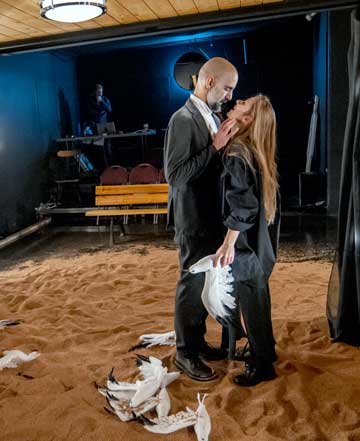Play (1896)
by Anton Chekhov
An Original Adaptation
Directed by Igor Golyak
Arlekin Players
Arlekin Players Theatre
368 Hillside Ave, Needham, MA
November 8 – December 15, 2019
With Anne Gottlieb (Irina Arkadina), Eliott Purcell (Konstantin Treplev), Dev Luthra (Pyotr Sorin), Irina Bordian (Nina Zarechnaya), Alexander Petetsky (Ilya Shamraev), Darya Denisova (Masha), Nael Nacert (Boris Trigorin), Igor Golyak (Director/Yevgeny Forn), Eric Andrews (Semyon Medvedenko)

Irina Bordian as Nina Zarechnaya
in “The Seagull”
Photo: Irina Danilova
Courtesy of Arlekin Players
Poor Konstantin (Eliott Purcell), so desperately in love with the beautiful young Nina (Irina Bordian) who will have nothing to do with him, wants to be a writer. Alas, he’s up against a lot, including a mother, Irina (Anne Gottlieb) who’s a famous actress and whose lover is the older, successful writer, Boris Trigorin (Nael Nacer). Failed in love, and without much support for his writing, Konstantin is pretty much at the end of his rope. Meanwhile, Nina falls for Trigorin, while Masha (Darya Denisova) longs for Konstantin who will have nothing to do with her.
Thankfully, it’s a comedy. And yet, it’s quite difficult to pull off as a comedy. Its alignments are so heavily weighted in the direction of failure and disappointment that only the most deft touch can elevate its absurdities to the level of the poignantly laughable. This small and intimate production, overseen by the interestingly hybridized Russian-American troupe The Arlekin Players under director Igor Golyak at times pulls off this kind of treacherous humor.
There is one point when, in rehearsing for a production depicted in the play, the actors in the play-within-the-play go through a series of tensing and loosening moves that is truly hilarious. Stuck in the middle of all the prevailing narrative darkness, it’s a breath of good clean air, and plenty of fun.
There are, indeed, some great actors in this production. Nael Nacer, who plays Trigorin, is one of Boston’s best, known for his broad range and compelling versatility. As well, Anne Gottlieb, who plays Irina, is, as well, a talented actress of note in the Boston area, seen last season in a very successful turn in the leading role of The Little Foxes at the Lyric Stage in Boston. They both do a fine job here as well, lending an assured grace to the goings-on.
As Konstantin, Eliott Purcell is intense and tragic, and his Mohawk adds a beautiful contemporary twist to the role. As Nina, Irina Bordian is evocatively and obsessively transfixed, effectively raising the voltage on all the conflicted love-circuits.
This production, billed as “an original adaptation” of the play, is a bit of a narrative hybrid as well, and is given a contextualization within the framework of Chekhov’s life and career. Attempting to set the play in its place inside Chekhov’s world, the additions to the script provide a recitation of Chekhov’s letters from the periods in question. One is, thereby, given the opportunity to see the relevance of both his constant creative frustrations as a writer and the somewhat hollow satisfactions of success.
Those tidbits indeed offer useful insights into the play, yet it seems a bit more like a secondary narrative that might have found its own home elsewhere. This production runs quite long at close to three hours, and though that’s not unheard of for Chekhov, the addition of the letters and background materials make that original girth expand enough to mute some of the overall narrative, and certainly, comedic, drive of the performance. It also seems as though pieces of the original had been cut to make room for some of the additions, yielding a sense of unexpected narrative abbreviations here and there.
The staging, though intimate, is quite darkly conceived, its main props a central area of sandy earth which presumably calls to mind the outside scenes, and a moveable set which represents the interior ones. Though ingeniously abstract, it’s a bit stark.
This play, as written, is itself rife with challenges. Everything is so dismal, including the ending, that it’s very difficult to quite understand how Chekhov conceived calling it a comedy. But he called some of his other quite dark plays comedies and he seems to have relied on the idea that his interpreters would be exactly able to capture the strange form of aesthetic glee the author takes in the sorts of existential knots he depicts. Indeed, comedy relies on sharpness, lightness and a certain punctuated encapsulation of the absurdities that it frames; when it comes off it can be wonderful, but it’s hard to do. This production, which emphasizes the tragic qualities of scotched ambitions and misaligned loves, pulls that dark wittiness off at some points when it enables those ironic highlights to emerge from the more pervasively grayer mists; and it certainly provides insights into what Chekhov was thinking as he ambled within them.
– BADMan (aka Charles Munitz)
Leave a Reply